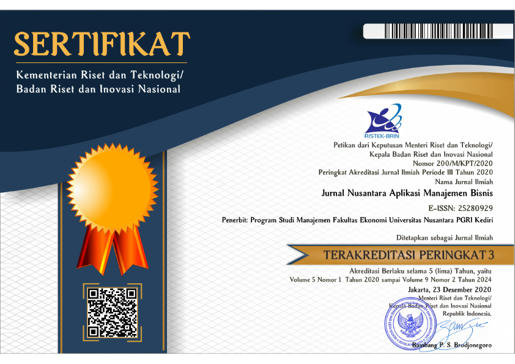Pola Perilaku Konsumsi Keluarga Penerima Manfaat Pkh (Program Keluarga Harapan) Di Kelurahan Pejagan Kecamatan Bangkalan Kabupaten Bangkalan
DOI:
https://doi.org/10.29407/nusamba.v5i2.14899Keywords:
Consumption patterns, Consumption Factors, PKHAbstract
The purpose of this study was to determine how consumption patterns of behavior before and after the family received PKH assistance in Pejagan Village, Bangkalan District, Bangkalan District. The research method used is descriptive qualitative, with a focus of research on the consumption patterns of PKH beneficiary families. Data collection methods are done by interview, observation, and documentation. Data analysis techniques were performed using data reduction, presentation, and drawing conclusions. To test the validity of the data using source triangulation. The results showed that the implementation of the Family Hope Program in Pejagan Sub-district, Bangkalan District, Bangkalan District had gone well because the distribution process to poor households was in accordance with procedures. The main objectives of the Harapan Families Program are to break the poverty chain, improve the quality of human resources, and change behavior that is less supportive in improving welfare. In this study welfare measurement is seen from household consumption patterns. It is known that the acceptance of the Family Hope Program assistance received by RTSM is sufficient to reduce the burden of household expenses on children's education costs. While in the household there are various kinds of needs both food and non-food
Downloads
References
Ananda, F. R. 2015. Analisis Pengaruh Sosial Ekonomi terhadap Pengeluaran Konsumsi Keluarga Miskin.
Cahyono, S. A. T. dan S. W. I. 2018. Gerak Langkah Program Keluarga Harapan : Konstribusi Program Keluarga Harapan Terhadap Kesejahteraan Keluarga Penerima Manfaat The Action Step Of Expected Family Program : The Contribution of Expected Family Program to the Welfare Improvement of Beneficia.
Badan Pusat Statistik Kabupaten Bangkalan. 2012. Jumlah Keluarga, Keluarga Miskin, dan Presentasenya Tahun 2012.
Badan Pusat Statistik Kabupaten Bangkalan. 2016. Angka Partisipasi Sekolah Tahun 2016.
Badan Pusat Statistik Provinsi Jawa Timur. 2017. Garis Kemiskinan Menurut Kabupaten di Jawa Timur Tahun 2017.
Direkrot Jenderal Perlindungan dan Jaminan Sosial. 2019. Petunjuk Pelaksanaan Pengelolaan Sumber Daya Manusia Program Keluarga Harapan 2019.
Fitrianingrum, D. dan T. S. 2014. Peran Pendamping Dan Ketua Kelompok Dalam Pemanfaatan Dana Pendidikan Program Keluarga Harapan ( PKH ) Di Desa Talok. Kajian Moral Dan Kewarganegaraan, 03(02), 753–768.
Haugton, J dan Shahidur R. K. 2012. Pedoman Tentang Kemiskinan dan Ketimpangan. Jakarta: Salemba Empat.
Ilmawan, B. 2013. Analisis Perbandingan Tingkat Kesejahteraan Rumah Tangga Petani dan Buruh Sandal di Desa Sukaharja Cijeruk - Bogor.
Khairunnisa, S. H. dan L. A. 2014. Determinan Angka Partisipasi Sekolah SMP di Jawa Barat. Jurnal Ekonomi Dan Pembangunan Indonesia, 15(1), 91. https://doi.org/10.21002/jepi.v15i1.444.
Kuntjorowati, E. 2018. Pengaruh Pemberdayaan Keluarga Penerima Manfaat Program Keluarga Harapan melalui. Jurnak PKS, 17, 89–100.
Kustanto, M. 2019. Konstruksi Sosial Tentang Pendidikan Pada Keluarga Penerima Manfaat (Kpm) Program Keluarga Harapan (Pkh) Di Kabupaten Sidoarjo. Sosio Konsepsia, 8( 3),267–281. https://doi.org/10.33007/ska.v8i3.1675.
Kusuma, M. K. 2018. Analisis Konsumsi Daging Sapi dan Daging Ayam pada Rumah Tangga Penerima Program Keluarga Harapan (PKH).
Menteri Sosial Republik Indonesia. (n.d.). 2018. Peraturan Menteri Sosial Republik Indonesia Nomor 1 Tahun 2018 Tentang Program Keluarga Harapan.
Prastiwi, P. A. dan S. H. 2018. Gaya Hidup Konsumtif Penerima Bantuan Pkh (Studi Di Desa Rejosari Kecamatan Kalidawir Kabupaten Tulungagung). Paradigma, 6(1), 1–8.
Rahardja, P., Mandala, M. 2014.Teori Ekonomi Mikro Edisi Kelima. Penerbit: Fakultas Ekonomi Universitas Indonesia.
Samoelson, Paul A., William, D. Nordhaus.1992. Mikro Ekonomi Edisi Keempatbelas. Jakarta: Erlangga.
Simanjutak, M., Herien, P., dan M. D. (2010). Karakteristik Demografi, Sosial, dan Ekonomi Keluarga. Jurnal Ilmu Keluarga Dan Konsumen, 3(2), 101–113.
Downloads
Published
Issue
Section
License
Authors who publish with this journal agree to the following terms:
- Copyright on any article is retained by the author(s).
- The author grants the journal, the right of first publication with the work simultaneously licensed under a Creative Commons Attribution License that allows others to share the work with an acknowledgment of the work’s authorship and initial publication in this journal.
- Authors are able to enter into separate, additional contractual arrangements for the non-exclusive distribution of the journal’s published version of the work (e.g., post it to an institutional repository or publish it in a book), with an acknowledgment of its initial publication in this journal.
- Authors are permitted and encouraged to post their work online (e.g., in institutional repositories or on their website) prior to and during the submission process, as it can lead to productive exchanges, as well as earlier and greater citation of published work.
- The article and any associated published material is distributed under the Creative Commons Attribution-ShareAlike 4.0 International License












